Related Research Articles
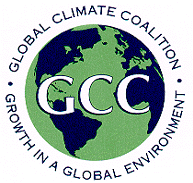
The Global Climate Coalition (GCC) (1989–2001) was an international lobbyist group of businesses that opposed action to reduce greenhouse gas emissions and engaged in climate change denial, publicly challenging the science behind global warming. The GCC was the largest industry group active in climate policy and the most prominent industry advocate in international climate negotiations. The GCC was involved in opposition to the Kyoto Protocol, and played a role in blocking ratification by the United States. The coalition knew it could not deny the scientific consensus, but sought to sow doubt over the scientific consensus on climate change and create manufactured controversy.
The Center for the Study of Carbon Dioxide and Global Change is a 501(c)(3) non-profit organization based in Tempe, Arizona. It is seen as a front group for the fossil fuel industry, and as promoting climate change denial. The Center produces a weekly online newsletter called CO2Science.
The American Petroleum Institute (API) is the largest U.S. trade association for the oil and natural gas industry. It claims to represent nearly 600 corporations involved in production, refinement, distribution, and many other aspects of the petroleum industry.
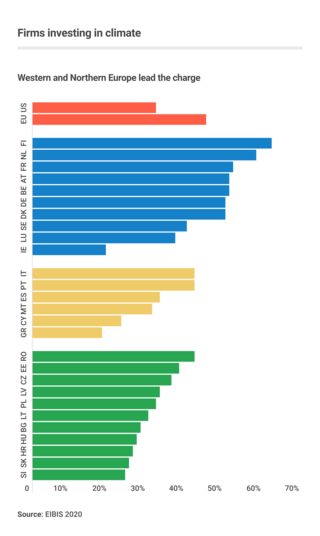
Business action on climate change includes a range of activities relating to climate change, and to influencing political decisions on climate change-related regulation, such as the Kyoto Protocol. Major multinationals have played and to some extent continue to play a significant role in the politics of climate change, especially in the United States, through lobbying of government and funding of climate change deniers. Business also plays a key role in the mitigation of climate change, through decisions to invest in researching and implementing new energy technologies and energy efficiency measures.
Robert L. Bradley Jr. is CEO and founder of the Institute for Energy Research (IER). An expert in the history and political economy of energy and energy corporations, Bradley is a senior fellow at the American Institute for Economic Research (AIER), as well as Energy and Climate Change fellow of the Institute of Economic Affairs in London.

The Texas Public Policy Foundation (TPPF) is a conservative think tank based in Austin, Texas. The organization was founded in 1989 by James R. Leininger, who sought intellectual support for his education reform ideas, including public school vouchers. Projects of the organization include Right on Crime, which is focused on criminal justice reform, and Fueling Freedom, which seeks to "explain the forgotten moral case for fossil fuels" by rejecting the scientific consensus on climate change.
The National Black Chamber of Commerce (NBCC) was incorporated as The National Black Chamber of Commerce, Inc., in 1993. It is a nonprofit, nonpartisan, nonsectarian organization dedicated to the economic empowerment of African American communities. Additionally, the organization indicates that it represents the views of its members regarding economic and political policy issues; domestically and internationally. It is organized as a 501(c) corporation and has at least 190 chapters within the United States. The NBCC also has international chapters in the Bahamas, Brazil, Colombia, Ghana and Jamaica. As with all Chambers of Commerce, affiliate branches are committed to carrying out the goals of the main Chamber within their areas.
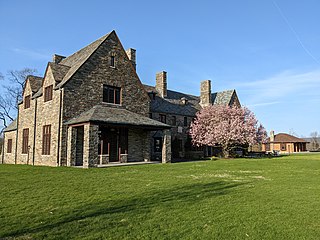
The American Institute for Economic Research (AIER) is a conservative and libertarian free-market think tank located in Great Barrington, Massachusetts. It was founded in 1933 by Edward C. Harwood, an economist and investment advisor. It is a 501(c)(3) nonprofit. During the COVID-19 pandemic, it was known for spreading misinformation and for promoting a herd immunity strategy of "focused protection" to deal with the pandemic.

The fossil fuels lobby includes paid representatives of corporations involved in the fossil fuel industry, as well as related industries like chemicals, plastics, aviation and other transportation. Because of their wealth and the importance of energy, transport and chemical industries to local, national and international economies, these lobbies have the capacity and money to attempt to have outsized influence governmental policy. In particular, the lobbies have been known to obstruct policy related to environmental protection, environmental health and climate action.
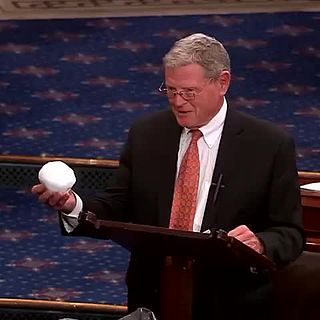
Climate change denial is the pseudoscientific dismissal or unwarranted doubt that contradicts the scientific consensus on climate change. Those promoting denial commonly use rhetorical tactics to give the appearance of a scientific controversy where there is none. Climate change denial includes doubts to the extent of how much climate change is caused by humans, its effects on nature and human society, and the potential of adaptation to global warming by human actions. To a lesser extent, climate change denial can also be implicit when people accept the science but fail to reconcile it with their belief or action. Several social science studies have analyzed these positions as forms of denialism, pseudoscience, or propaganda.
Energy subsidies are measures that keep prices for customers below market levels, or for suppliers above market levels, or reduce costs for customers and suppliers. Energy subsidies may be direct cash transfers to suppliers, customers, or related bodies, as well as indirect support mechanisms, such as tax exemptions and rebates, price controls, trade restrictions, and limits on market access.
The Koch family is an American family engaged in business, best known for their political activities and their control of Koch Industries, the 2nd largest privately owned company in the United States. The family business was started by Fred C. Koch, who developed a new cracking method for the refinement of heavy crude oil into gasoline. Fred's four sons litigated against each other over their interests in the business during the 1980s and 1990s.
Charles G. and David H. Koch (1940–2019), sometimes referred to as the Koch brothers, have become famous for their financial and political influence in United States politics with a libertarian, more so, right-libertarian or American-style libertarian political stance. From around 2004 to 2019, with "foresight and perseverance", the brothers organized like-minded wealthy libertarian-oriented conservatives, spent hundreds of millions of dollars of their own money to build an "integrated" and "stealth" network of think tanks, foundations, "grassroots" movements, academic programs, advocacy and legal groups to "destroy the prevalent statist paradigm" reshape public opinion to favor minimal government. As of mid 2018, the media has been encouraged to refer to the "Koch network" rather than the "Koch brothers".
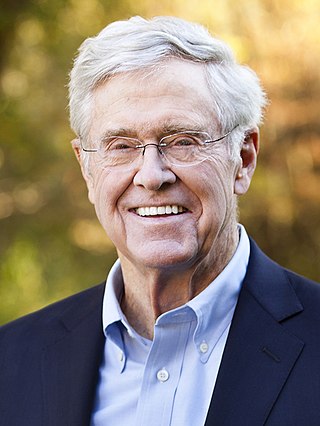
Charles de Ganahl Koch is an American billionaire businessman. As of November 2023, he was ranked as the 22nd richest man in the world on the Bloomberg Billionaires Index, with an estimated net worth of $60 billion. Koch has been co-owner, chairman, and chief executive officer of Koch Industries since 1967, while his late brother David Koch served as executive vice president. Charles and David each owned 42% of the conglomerate. The brothers inherited the business from their father, Fred C. Koch, then expanded the business. Koch Industries is the largest privately held company by revenue in the United States, according to Forbes.

Thomas H. Stoner Jr. is lead director and a co-founder, along with Nobel laureate David Schimel of the Jet Propulsion Lab (NASA) and other leading climate experts, of Entelligent, a global provider of Smart Climate indexes, predictive equity portfolio analytics and advanced data on climate risk and climate transition. He served as CEO of Entelligent from 2017 to October 2023. Prior to Entelligent, Stoner founded Project Butterfly, a research organization that advocates primarily for the global capital markets as a solution to climate change. The research produced by Project Butterfly led to the creation of Entelligent and ultimately yielded two climate risk patents issued by the USPTO. Stoner is also the author of the 2013 book, "Small Change, Big Gains: Reflections of an Energy Entrepreneur," which includes research about transforming the global energy supply to be more reliant on sustainable fuel sources by the end of the century. Stoner has been a promoter of sustainable development for over 30 years, having built, financed and owned and operated renewable energy projects throughout the Americas. He has led three companies in the clean technology space, including one of the original cleantech venture funds backed by international development banks, including the Multilateral Investment Fund, a division of the Inter-American Development Bank.

As the world's largest majority investor-owned oil and gas corporation, ExxonMobil has received significant amounts of controversy and criticism, mostly due to its activities which increase the speed of climate change and its denial of global warming.

Since the 1970s, American fossil fuel and energy corporation ExxonMobil has engaged in climate research focusing on global warming. It later began lobbying, advertising, and grant making, some of which were conducted with the purpose of delaying widespread acceptance and action on global warming.

The tobacco industry playbook, tobacco strategy or simply disinformation playbook describes a strategy devised by the tobacco industry in the 1950s to protect revenues in the face of mounting evidence of links between tobacco smoke and serious illnesses, primarily cancer. Much of the playbook is known from industry documents made public by whistleblowers or as a result of the Tobacco Master Settlement Agreement. These documents are now curated by the UCSF Truth Tobacco Industry Documents project and are a primary source for much commentary on both the tobacco playbook and its similarities to the tactics used by other industries, notably the fossil fuel industry. It is possible that the playbook may even have originated with the oil industry.
The Stanford Doerr School of Sustainability is a school at Stanford University focusing on climate change and sustainability. The school also researches many domains of fossil fuel extraction and development. It opened on September 1, 2022, as Stanford's first new school since the School of Humanities and Sciences in 1948. It is considered one of the largest climate change–related schools in the United States.

The Petroleum Papers is a 2022 non-fiction book by journalist Geoff Dembicki on climate change and the fossil fuel industry.
References
- 1 2 3 4 "About Us". Institute for Energy Research. Retrieved 4 December 2015.
- 1 2 3 Goldenberg, Suzanne; Bengtsson, Helena (June 13, 2016). "Biggest US coal company funded dozens of groups questioning climate change". The Guardian . Retrieved 28 June 2016.
- 1 2 3 4 Negin, Elliott (July 19, 2013). "Koch-Funded Climate Contrarians Make Mischief on Capitol Hill". Huffington Post . Retrieved 7 October 2016.
- 1 2 3 4 Harkinson, Josh (December 4, 2009). "The Dirty Dozen of Climate Change Denial". Mother Jones . Retrieved September 30, 2015.
- ↑ "Interview with Greg Rehmke, MasterResource, June 23, 2021". 23 June 2021.
- 1 2 Fang, Lee (29 August 2014). "Charles Koch Personally Founded Group Protecting Oil Industry Hand-Outs, Documents Reveal". Republic Report. Essential Information. Retrieved 4 July 2018.
- ↑ "Conservative Spotlight: Institute for Energy Research". Human Events.
- ↑ Surgey, Nick (5 December 2016). "Revealed: The Trump Administration's Energy Plan". PR Watch.
- ↑ Institute for Energy: Staff. Archived 2013-05-07 at the Wayback Machine
- ↑ "Institute for Energy Research. 2012 Return of Organization Exempt from Income Tax" (PDF). Guidestar. 2012. Retrieved 2022-03-19.
- ↑ Evans, Will (September 22, 2008). "New Group Tied To Oil Industry Runs Ads Promoting Drilling, Attacking Democrat". National Public Radio . Retrieved March 18, 2015.
- ↑ Vogel, Kenneth (March 29, 2012). "Kochs linked to anti-Obama gas ads". Politico . Retrieved 4 December 2015.
- ↑ Erman, Michael (23 May 2008). "Exxon again cuts funds for climate change skeptics". Reuters .
- ↑ "Mission Statement". American Energy Alliance. Retrieved 2020-10-03.
- ↑ "American Energy Alliance Homepage". The American Energy Alliance. Retrieved 12 April 2013.
- ↑ Restuccia, Andrew (13 November 2012). "Fans, foes at war over wind tax credit extension". Politico .